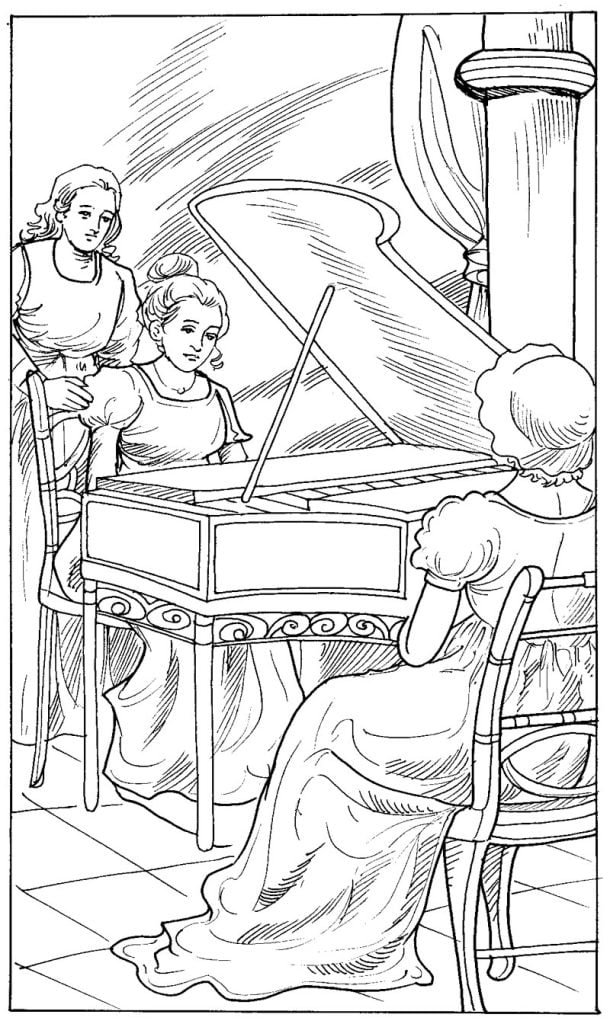Chapter 14
Emma did not repent her condescension in going to the Coles. The visit afforded her many pleasant recollections the next day; and all that she might be supposed to have lost on the side of dignified seclusion, must be amply repaid in the splendour of popularity. She must have delighted the Coles—worthy people, who deserved to be made happy! And left a name behind her that would not soon die away.
Perfect happiness, even in memory, is not common; and there were two points on which she was not quite easy. She doubted whether she had not transgressed the duty of woman by woman, in betraying her suspicions of Jane Fairfax’s feelings to Frank Churchill. It was hardly right; but it had been so strong an idea, that it would escape her, and his submission to all that she told, was a compliment to her penetration, which made it difficult for her to be quite certain that she ought to have held her tongue. The other circumstance of regret related also to Jane Fairfax; and there she had no doubt. She did unfeignedly and unequivocally regret the inferiority of her own playing and singing. She did most heartily grieve over the idleness of her childhood and sat down and practised vigorously an hour and a half.
She was then interrupted by Harriet’s coming in; and if Harriet’s praise could have satisfied her, she might soon have been comforted.
“Oh! if I could but play as well as you and Miss Fairfax!”
“Don’t class us together, Harriet. My playing is no more like her’s, than a lamp is like sunshine.”

“Oh! dear—I think you play the best of the two. I think you play quite as well as she does. I am sure I had much rather hear you. Every body last night said how well you played.”
“Those who knew any thing about it, must have felt the difference. The truth is, Harriet, that my playing is just good enough to be praised, but Jane Fairfax’s is much beyond it.”
“Well, I always shall think that you play quite as well as she does, or that if there is any difference nobody would ever find it out. Mr. Cole said how much taste you had; and Mr. Frank Churchill talked a great deal about your taste, and that he valued taste much more than execution.”
“Ah! but Jane Fairfax has them both, Harriet.”
“Are you sure? I saw she had execution, but I did not know she had any taste. Nobody talked about it. And I hate Italian singing. There is no understanding a word of it. Besides, if she does play so very well, you know, it is no more than she is obliged to do, because she will have to teach. The Coxes were wondering last night whether she would get into any great family. How did you think the Coxes looked?”
The appearance of the little sitting-room as they entered, was tranquillity itself; Mrs. Bates, deprived of her usual employment, slumbering on one side of the fire, Frank Churchill, at a table near her, most deedily occupied about her spectacles, and Jane Fairfax, standing with her back to them, intent on her pianoforte. Busy as he was, however, the young man was yet able to shew a most happy countenance on seeing Emma again.
“This is a pleasure,” said he, in rather a low voice, “coming at least ten minutes earlier than I had calculated. You find me trying to be useful; tell me if you think I shall succeed.”
“What!” said Mrs. Weston, “have not you finished it yet? you would not earn a very good livelihood as a working silversmith at this rate.”
“I have not been working uninterruptedly,” he replied, “I have been assisting Miss Fairfax in trying to make her instrument stand steadily, it was not quite firm; an unevenness in the floor, I believe. You see we have been wedging one leg with paper. This was very kind of you to be persuaded to come. I was almost afraid you would be hurrying home.”
He contrived that she should be seated by him; and was sufficiently employed in looking out the best baked apple for her, and trying to make her help or advise him in his work, till Jane Fairfax was quite ready to sit down to the pianoforte again. That she was not immediately ready. Emma did suspect to arise from the state of her nerves; she had not yet possessed the instrument long enough to touch it without emotion; she must reason herself into the power of performance; and Emma could not but pity such feelings, whatever their origin, and could not but resolve never to expose them to her neighbour again.
At last Jane began, and though the first bars were feebly given, the powers of the instrument were gradually done full justice to. Mrs. Weston had been delighted before, and was delighted again; Emma joined her in all her praise; and the pianoforte, with every proper discrimination, was pronounced to be altogether of the highest promise.

